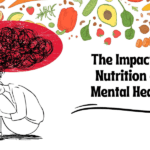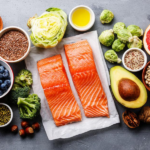Key Nutrients for a Healthy and Balanced Diet
A healthy, balanced diet is crucial for maintaining overall health, vitality, and the prevention of diseases. Consuming the right combination of minerals ensures that our bodies function efficiently, repair themselves, and adapt to the demands of daily life. This guide delves into the essential nutrients required for a balanced diet and how they support overall well-being.
What Are Essential Nutrients?
Essential minerals are compounds that our bodies cannot synthesize on their own or in sufficient amounts, making it necessary to obtain them from our diets. These minerals are broadly categorized into macronutrients, micronutrients, and water.
Macronutrients
Macronutrients are required in large quantities and serve as the building blocks of our energy and structural needs. They include:
- Carbohydrates
- Proteins
- Fats
Micronutrients
Micronutrients are required in smaller amounts but are equally vital for health:
- Vitamins
- Minerals
In addition to these, water is considered an essential nutrient for sustaining life and supporting all bodily functions.
Macronutrients: The Building Blocks of Energy

Carbohydrates
Carbohydrates are the body’s primary energy source and play a significant role in brain function and physical activity.
- Role: Provide fuel for the brain, muscles, and other body systems.
- Sources: Whole grains (brown rice, oats), fruits (apples, bananas), vegetables (sweet potatoes, carrots), and legumes (beans, lentils).
- Types:
- Simple carbohydrates: Found in sugars such as glucose and fructose, providing quick energy.
- Complex carbohydrates: Found in starches and dietary fiber, offering sustained energy and digestive health.
Proteins
Proteins are essential for building, repairing, and maintaining body tissues.
- Role: Play a key role in muscle repair, immune responses, and the production of enzymes and hormones.
- Sources: Lean meats, poultry, fish, eggs, dairy products, legumes, nuts, and seeds.
- Amino Acids: Proteins consist of amino acids, including nine essential ones that the body cannot produce and must obtain from food.
Fats
Fats are not only a source of energy but also crucial for absorbing certain vitamins and maintaining cell structure.
- Role: Provide long-term energy storage, support brain function, and insulate and protect organs.
- Types:
- Healthy fats: Unsaturated fats (e.g., omega-3 and omega-6 found in fish, nuts, seeds, and olive oil).
- Unhealthy fats: Trans fats and excessive saturated fats, which can contribute to heart disease.
- Sources: Avocados, fatty fish (salmon, mackerel), nuts (almonds, walnuts), seeds (chia, flaxseeds), and plant-based oils.
Micronutrients: The Unsung Heroes

Vitamins
Vitamins are organic compounds necessary for various physiological functions.
- Types:
- Fat-soluble vitamins (A, D, E, K): Stored in the body and essential for long-term health.
- Water-soluble vitamins (C and B-complex): Not stored in the body and require daily intake.
- Functions:
- Vitamin A: Enhances vision, immunity, and skin health.
- Vitamin D: Facilitates calcium absorption and promotes bone health.
- Vitamin E: Protects cells from oxidative damage.
- Vitamin C: Supports immune function and aids in collagen production.
- B Vitamins: Assist in energy metabolism and red blood cell production.
- Sources: Colorful fruits (oranges, berries), vegetables (spinach, broccoli), dairy, eggs, and fortified foods.
Minerals
Minerals are inorganic elements vital for structural and functional roles in the body.
- Key Minerals:
- Calcium: Strengthens bones and teeth; found in milk, cheese, and green leafy vegetables.
- Iron: Essential for oxygen transport in the blood; found in red meat, spinach, and legumes.
- Potassium: Maintains fluid balance and supports muscle contractions; found in bananas, potatoes, and citrus fruits.
- Magnesium: Supports nerve and muscle function and energy production; found in nuts, seeds, and whole grains.
- Zinc: Boosts immunity and aids wound healing; found in meat, shellfish, and legumes.
Water: The Elixir of Life
Water is indispensable for life and plays a role in nearly every physiological function.
- Role:
- Regulates body temperature.
- Facilitates nutrient transportation.
- Aids in digestion and waste elimination.
- Daily Requirement: Around 8-10 glasses per day, depending on activity levels and environmental factors.
- Sources: drinking water, fruits (watermelon, oranges), and vegetables (cucumbers, lettuce).
Special Nutritional Needs
For Children
Growing bodies need adequate nutrition to support development.
- Focus on: protein, calcium, and essential vitamins.
- Sources: milk, eggs, fresh fruits, and vegetables.
For Seniors
Aging bodies benefit from targeted minerals to maintain bone density and prevent chronic conditions.
- Focus on: Vitamin D, calcium, and fiber.
- Sources: Dairy, fortified foods, and whole grains.
For Athletes
Athletes require additional energy and protein to fuel performance and recovery.
- Focus on: carbohydrates for energy and protein for muscle repair.
- Sources: whole grains, lean meats, nuts, and energy-dense snacks.
Balancing Your Plate
Proportionate Eating
A balanced plate should include:
- Half of the plate: Fruits and vegetables.
- A quarter of the plate: Whole grains.
- A quarter of the plate: Lean protein.
Limit Added Sugars and Salt
Excess sugar and salt intake can lead to obesity and hypertension.
- Tips:
- Read food labels carefully.
- Use natural sweeteners like honey.
- Season foods with herbs and spices instead of salt.
Common Nutritional Deficiencies
Iron Deficiency (Anemia)
- Symptoms: fatigue, pale skin, and weakness.
- Prevention: Include iron-rich foods like spinach and red meat, paired with vitamin C for better absorption.
Vitamin D Deficiency
- Symptoms: Bone pain, muscle weakness, and fatigue.
- Prevention: Get adequate sunlight exposure and consume fortified foods.
Calcium Deficiency
- Symptoms: Weak bones and teeth, brittle nails.
- Prevention: Include dairy products and fortified alternatives in your diet.
Practical Tips for a Balanced Diet
- Plan Your Meals: Prepare a weekly menu that incorporates all food groups.
- Include seasonal and local produce: opt for fresh, nutrient-dense options.
- Practice Portion Control: Use smaller plates to avoid overeating.
- Stay Hydrated: Keep a water bottle handy to meet your hydration goals.
- Incorporate Variety: Experiment with different cuisines and recipes to keep your diet interesting.
Final Thoughts
A healthy, balanced diet is the foundation of a long, energetic, and disease-free life. By ensuring a mix of essential nutrients, staying hydrated, and making conscious food choices, you can maintain optimal health and well-being. Remember, a balanced diet is not about perfection; it’s about making consistent, mindful choices that align with your health goals.















